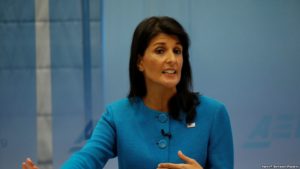Special to WorldTribune.com
Radio Free Europe / Radio Liberty
The United Nations Security Council on September 11 voted to tighten sanctions on North Korea over the country’s sixth and most powerful nuclear test, imposing a ban on the country’s textile exports and setting a limit on imports of crude oil.
It was the ninth sanctions resolution unanimously adopted by the 15-member council since 2006 over North Korea’s ballistic missile and nuclear programs.

North Korea on September 12 rejected the UN resolution and said the United States would soon face the “greatest pain” it had ever experienced.
Pyongyang’s ambassador Han Tae Song, addressing the UN-sponsored Conference on Disarmament in Geneva, said the United States was “fired up for political, economic, and military confrontation” and was “obsessed with the wild game of reversing” North Korea’s “development of a nuclear force which has already reached the completion phase.”
To win the support of Russia and China, which had been reluctant to impose new sanctions, UN diplomats told news agencies that the United States watered down its previous proposal for a full oil embargo, eliminated a proposed asset freeze on leader Kim Jong Un, and included language calling for a “peaceful, diplomatic, and political” resolution of the standoff on the Korean Peninsula.
U.S. Ambassador to the UN Nikki Haley said the new measures would deprive Pyongyang of at least $800 million in annual export revenues, primarily from banning its textile exports, and when combined with previous sanctions, would cut off about 90 percent of North Korea’s earnings from exports.
“We don’t take pleasure in further strengthening sanctions today. We are not looking for war,” Haley said after the council’s vote. “The North Korean regime has not yet passed the point of no return.”
“If it agrees to stop its nuclear program, it can reclaim its future… If North Korea continues its dangerous path, we will continue with further pressure,” she said.
Haley credited a “strong relationship” between U.S. President Donald Trump and Chinese President Xi Jinping for the unexpectedly swift success of negotiations in the last week to draft a resolution that won unanimous support from the council.
Russian, Chinese Reservations
Both China had Russia had expressed reservations about imposing further sanctions, with Russian President Vladimir Putin saying last week that he doubted they would prompt Pyongyang to back off its nuclear program.
Russia’s UN ambassador, Vasily Nebenzya, said on September 11 that Moscow supports the new sanctions because “leaving nuclear tests without a firm reaction would be wrong.”
He once again urged the United States and its allies to consider a Russian-Chinese proposal that would start with the United States and South Korea suspending their regular military exercises in exchange for Pyongyang suspending its nuclear and ballistic missile tests. Haley and other U.S. officials have repeatedly dismissed the plan.
“We think it’s a big mistake to underestimate this Russia-China initiative,” Nebenzya said. “It remains on the table at the Security Council and we will insist on it being considered.”
“We’re convinced that diverting the gathering menace from the Korean Peninsula could be done not through further and further sanctions, but by political means,” he said.
China’s UN ambassador, Liu Jieyi, called for a resumption of negotiations “sooner rather than later.” He called on North Korea to “take seriously” the will of the international community to halt its nuclear and ballistic missile development.
Hitting Exports
China would bear much of the responsibility for enforcing the new sanctions as it is the destination of most of North Korea’s textile exports and it provides most of Pyongyang’s crude oil, according to official statistics.
The resolution would particularly hit North Korea’s textile exports, which are second only to coal and other minerals in generating earnings, bringing in a total of $752 million last year, according to the Korea Trade-Investment Promotion Agency.
While not imposing a flat-out ban on oil exports to Pyongyang, as originally proposed by the United States, the UN Council’s resolution imposes a cap on crude exports at current levels of about 4 million barrels a year, and puts a cap of 2 million barrels a year on refined petroleum products.
The resolution also bars countries from issuing new work permits to North Korean laborers sent abroad — a measure that would phase out the guest worker over time as existing work permits expire, the U.S. mission at the UN said. Most of the guest workers have been employed in China and Russia.
“This resolution also puts an end to the regime making money from the 93,000 North Korean citizens it sends overseas to work and heavily taxes. This ban will eventually starve the regime of an additional $500 million or more in annual revenues,” Haley said.
In a push for a diplomatic solution to the crisis, the resolution says dialogue is needed to “ensure lasting stability in northeast Asia” and “to resolve the situation through peaceful, diplomatic, and political means.”
The new measures in response to Pyongyang’s September 3 nuclear test come about one month after the UN Council banned exports of coal, lead, and seafood in response to North Korea’s launch of an intercontinental ballistic missile.
Before the measures were approved, Pyongyang warned the United States on September 11 that it would “pay a price” for spearheading the UN sanctions effort.
